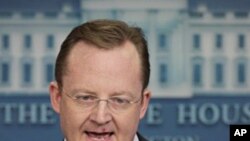As President Barack Obama and senior U.S. officials monitor the situation in Egypt, the president's spokesman has underscored what Mr. Obama says needs to happen there. The president on Monday called in top Mideast experts to advise him on next steps.
Press Secretary Robert Gibbs was repeatedly pressed to explain what Washington hopes to see in the way of Egyptian government actions, and whether Mr. Obama believes that Egyptian President Hosni Mubarak is the one to carry out reforms that Egyptians would accept as legitimate.
Gibbs referred to Secretary of State Hillary Clinton's remarks on Sunday, calling for an "orderly transition." The White House said President Obama later told world leaders in telephone conversations that Egypt needs to transition to a government that is responsive to the aspirations of the people.
The president's spokesman said only Egyptians can determine what the future will look like.
"That is not for our country or our government to determine," said Gibbs. "I don't think that people who seek greater freedom are looking for somebody else to pick what and how that change looks like."
Gibbs declined to answer a question as to whether President Obama would specifically call for President Mubarak to step down. There must be meaningful negotiations, he added, with a broad cross-section of the Egyptian people, including opposition groups.
Gibbs was also asked about the U.S. position on potential participation of the Muslim Brotherhood in any new governing structure, saying that the United States has had no contact with the group.
"We have as we have throughout the world, standards for that contact - that is adherence to the law, adherence to non-violence and a willingness to be part of a democratic process, but not use that democratic process to simply instill yourself into power," he said.
Slideshow of events in Egypt over the past two days
Asked about an Associated Press report quoting unidentified administration officials as saying the United States is pressing Mr. Mubarak to undertake key reforms, including credible presidential elections in September, Gibbs said that public and private messages to President Mubarak are the same.
On the plan for a million man march in Cairo on Tuesday to call for President Mubarak's resignation, Gibbs referred to contacts underway between the State Department and Egypt's foreign ministry, and between U.S. and Egyptian military officials, saying that the U.S. believes Egypt is clear about the need to avoid violence.
In addition to briefings from his national security team, President Obama has received advice from Mideast and other experts, some of whom came to the White House on Monday.
Vice President Joe Biden has been involved in contacts with foreign leaders. On Monday, he telephoned Bahrain's King Hamad bin Isa al-Khalifa to discuss the situation in Egypt.
It's not known to what extent Mr. Obama has spoken with former U.S. presidents such as Jimmy Carter, who presided over the signing of the Egypt-Israel peace accords in 1978.
Mr. Carter has described events in Egypt as "the most profound situation in the Middle East" since he left office, saying he believes that President Mubarak "will have to leave."
The White House says the crisis in Egypt has not interrupted Mr. Obama's focus on domestic affairs and the economy. The president is scheduled to travel to Pennsylvania on Wednesday as part of his efforts to promote new investments to spur economic growth.





